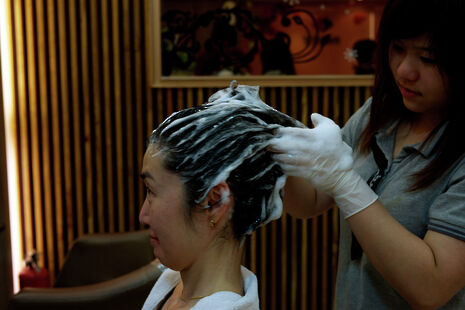Trash Talk, episode five: Scrubbing up
Kate Emden returns to look at toiletries with an environmentally-minded difference

After a brief hiatus last week, I thought I’d treat you all (but mostly myself) to a visual exploration of a zero-waste beauty regime. Greenifying your bathroom cupboard is easily achieved with a few simple toiletries swaps. There are zero-waste alternatives to almost every product you could possibly imagine using, so for the items I don’t cover here, a quick Google search is all that’s required to greatly reduce your waste impact.
But here and now, for your procrastination, are some of my top swap tips in sub-par GIF form. These tiny routine changes make a huge difference to waste production over lifetimes. All it takes is nurturing different buying habits. In many cases the green alternatives are also cheaper, and using simple products enables you to really understand what you’re putting on your body.
Buy a shampoo bar from Lush
Lush is pretty much a dream land for selling zero-packaging toiletries, including conditioner, soap and deodorant bars. I am a fan of their shampoo bars, which their website claims can do the job of three 250g bottles of liquid shampoo. Economical and environmentally friendly. (And they smell excellent.)
Other zero-waste shampoo alternatives include eggs, bicarbonate of soda and soapwort. Join the ‘no poo’ movement by ditching the shampoo.
Seanik Shampoo Bar from Lush: £5.95
Use natural oil as hair conditioner
I use olive oil, which I buy from the Holland & Barrett in Lion Yard Shopping Centre. Brilliantly, they allow you to refill your bottle there, although the oil is always flavoured: mine’s got a hint of chilli. Sainsbury’s also sells olive oil in glass bottles, which, although not-refillable, are still recyclable and somewhat cheaper. It’s incredibly nourishing for hair and the antioxidants in the oil can help to keep your scalp healthy. Others swear by using coconut oil on their hair. It’s reportedly great for banishing dandruff and taming frizzy hair. I find that olive oil makes my hair curlier, but obviously you’ve just got to figure out what works best for you, to the same degree thatyou would experiment with specially manufactured, bottled hair conditioners.
Initial purchase of olive oil with glass bottle from Holland & Barrett (100ml/250ml): £3.99/£7.99
Subsequent refills: £2.49/£5.99
Use natural oil as moisturiser
The benefits which oils bring to your hair they also bring to your skin. I use coconut oil on my skin for its antibacterial and cleansing properties. You really only need a tiny amount per application, meaning it lasts a really long time. Again, olive oil is also a great choice for some, especially those with drier skin. And being natural oils, they won’t contain any ‘nasty’ chemical additives.
Make your own deodorant
To make deodorant, I just melt some coconut oil together with some bicarbonate of soda and then keep it in one of the recycled metal tins from Lush. To use, I poke my finger into the mush and then smear under my arms. This works well for me, although there are many different recipes to be found online. If this one doesn’t work for you, don’t lose hope! It may take some experimentation but all the recipes are similarly simple. And don’t worry about wasting money on the oil and soda if this one doesn’t turn out to be your dream deodorant: they’re both immensely useful staples for various other toiletry uses, as demonstrated by even this short list.
Coconut oil: £3.95 for a 300ml glass tub from Sainsbury’s
Bicarbonate of soda: 85p for a 180g plastic tub from Sainsbury’s
(I’ve been informed you can buy the soda in cardboard boxes from Tesco, which is even better.)
Lush tin: £2.95
Buy bamboo toothbrushes
This is the one toiletry item I haven’t yet been able to source locally. As I therefore had to buy them online, I ordered enough for the year to best utilise the packaging they would invariably be sent in. I am now the not-so-proud owner of a plastic-filled padded envelope, which I will re-use when necessity strikes. The individual toothbrushes themselves come in recyclable cardboard boxes. The bamboo is compostable, but unfortunately the plastic bristles are not, so those will have to be removed and binned when the toothbrush reaches the end of its working life. Still a definite improvement on all-plastic toothbrushes, however.
For toothpaste, I’m just using bicarbonate of soda, and my teeth honestly feel cleaner after I brush them than when I was using conventional toothpaste. Can seriously recommend. And as with so many simple zero-waste swaps, it’s so much cheaper!
Environmental toothbrush: £15.35 for four toothbrushes plus delivery from the Ethical Superstore
(There are various different brands of bamboo brush, but this was the one that looked best to me.)
As always, send any comments or suggestions to kpoe2@cam.ac.uk
 News / Cambridge University disables comments following Passover post backlash 24 April 2024
News / Cambridge University disables comments following Passover post backlash 24 April 2024 Comment / Gown vs town? Local investment plans must remember Cambridge is not just a university24 April 2024
Comment / Gown vs town? Local investment plans must remember Cambridge is not just a university24 April 2024 News / Fitz students face ‘massive invasion of privacy’ over messy rooms23 April 2024
News / Fitz students face ‘massive invasion of privacy’ over messy rooms23 April 2024 Interviews / Gender Agenda on building feminist solidarity in Cambridge24 April 2024
Interviews / Gender Agenda on building feminist solidarity in Cambridge24 April 2024 Comment / Does Lucy Cavendish need a billionaire bailout?22 April 2024
Comment / Does Lucy Cavendish need a billionaire bailout?22 April 2024





